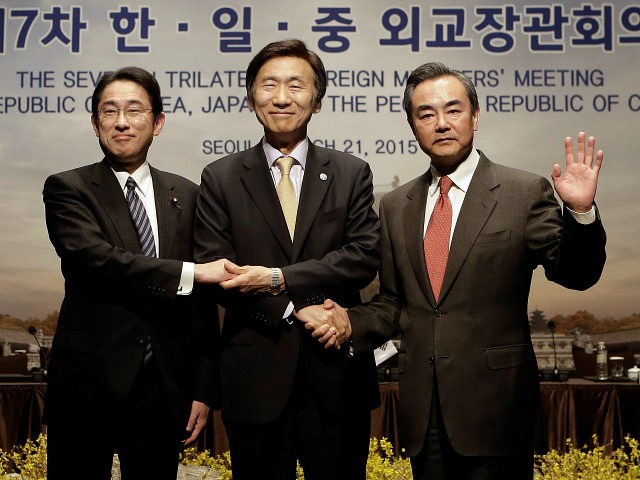The foreign ministers of China, Japan, and South Korea are looking to schedule a meeting in Japan next week, the first time Chinese Foreign Minister Wang Yi will have visited Japan and first such visit since Xi Jinping became president.
The South China Morning Post reports that the foreign ministers of all three countries are finalizing scheduled meetings on August 23 and 24. The meetings will be notable both for being the first such meetings in Japan in five years and the first time Xi sends a foreign minister to Japan.
The Post notes that successful diplomacy between the three could yield a meeting among their bosses — Xi, Japanese Prime Minister Shinzo Abe, and South Korean President Park Geun-hye — at next month’s G20 summit in China. Such a meeting will be only the third between Abe and Xi of both their tenures.
While the Chinese foreign minister has yet to visit Japan, Japanese foreign minister Fumio Kishida was in China as recently as last May. That visit was the first of its kind in over four years.
The three nations have a number of disputes to resolve that may surface in next week’s meetings. China and Japan continue to disagree on their respective ownership of the Senkaku Islands in the East China Sea, uninhabited but resource-rich land masses. China claims the islands, which it calls the Diaoyu, and has increased its presence near them. Japan argues the islands are indisputably Japanese.
While Japan does not make any territorial claims in the South China Sea, Beijing has still blamed its neighbor for an international legal ruling released earlier this summer striking down all of China’s claims in the region. China claims territories that include the exclusive economic zones of Indonesia, Malaysia, Brunei, Taiwan, Vietnam, and the Philippines. Japan has stood by the plaintiff nations and called for China to reduce tensions in the region. China, in turn, accused Japan’s “eunuch” politicians of having rigged the judicial ruling against China, despite the Philippines being the plaintiff in that proceeding.
Reuters reports that “unnamed diplomatic sources” have said that Japan’s rescue of Chinese fishermen near the Senkaku Islands may have helped rehabilitate the bilateral relationship. Though the fishermen were in Japanese territory, Japanese coast guard officials rescued the men and safely returned them to China. Japan’s Nikkei proposes that Japan’s reserved observance of the anniversary of the end of World War II — notably, the lack of high-level official visits to the Yasukuni Shrine, which honors men China identifies as war criminals — that warmed China toward more diplomacy.
As for Japan and South Korea, the latter nation still seeks apologies from Japan over the use of Korean women as sex slaves, or “comfort women,” during World War II. But the nations have a common problem in North Korea, which has continually tested long-range missiles by shooting them towards both South Korea and Japan and has threatened nuclear attacks on its southern neighbor. Curbing North Korea, the South China Morning Post notes, will be an issue all three nations will seek to eagerly discuss.

COMMENTS
Please let us know if you're having issues with commenting.